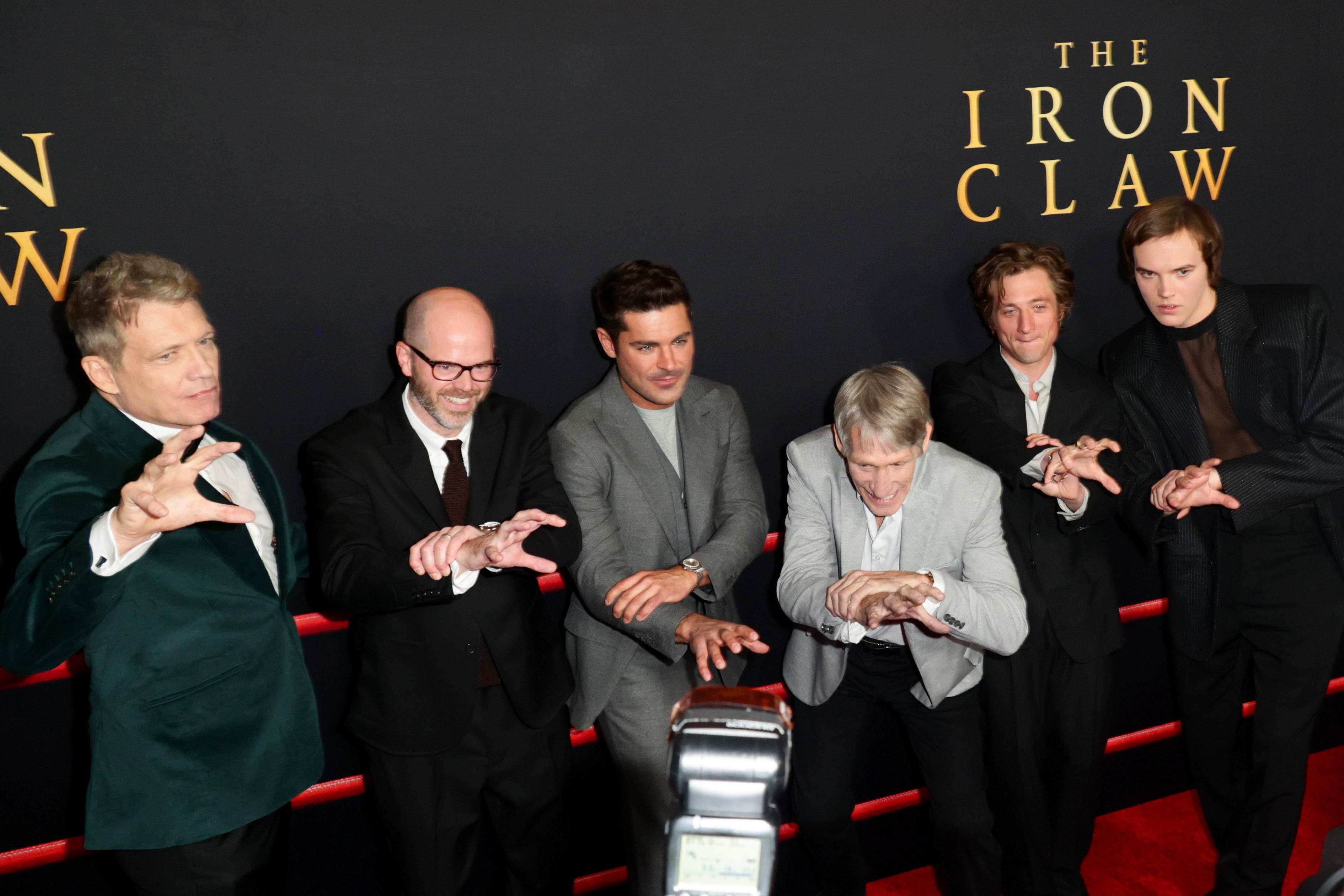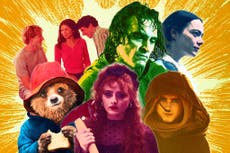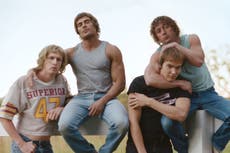The Independent's journalism is supported by our readers. When you purchase through links on our site, we may earn commission.
The most remarkable thing about ‘The Iron Claw’ might be happening off-camera
How the movie’s real-life subjects have received the film is nothing short of fascinating, Clémence Michallon writes


Your support helps us to tell the story
From reproductive rights to climate change to Big Tech, The Independent is on the ground when the story is developing. Whether it's investigating the financials of Elon Musk's pro-Trump PAC or producing our latest documentary, 'The A Word', which shines a light on the American women fighting for reproductive rights, we know how important it is to parse out the facts from the messaging.
At such a critical moment in US history, we need reporters on the ground. Your donation allows us to keep sending journalists to speak to both sides of the story.
The Independent is trusted by Americans across the entire political spectrum. And unlike many other quality news outlets, we choose not to lock Americans out of our reporting and analysis with paywalls. We believe quality journalism should be available to everyone, paid for by those who can afford it.
Your support makes all the difference.Early in The Iron Claw, the new A24 movie about the real-life Von Erich family, Kerry Von Erich is told by his father that he should become a professional wrestler like his brothers, joining the family business that turned the Von Erichs into wrestling legends. “Yes Sir,” he tells his dad, the late Fritz Von Erich. “I’d love that.” His brothers hug him in celebration, and Kerry, with his siblings, swiftly ascend to superstardom.
Despite the success of the Von Erich siblings – Kevin, David, Kerry, Mike, and Chris – climbing up the wrestling ranks in the 1980s and 1990s, they faced personal tragedies. David, Kerry, Mike, and Chris all died young, three of them by suicide.
Sean Durkin, who directed and wrote The Iron Claw, has said that he came to the Von Erichs first as a fan, having admired them since childhood. The movie delves into multiple layers of personal pain, while also bringing the flamboyant world of wrestling to the screen. For a film with so much noise – Sports! Entertainment! Muscles! Violence! – The Iron Claw stays commendably focused on its inside story, too.
The Von Erich family wasn’t consulted in the making of the film. Durkin has said, “It happened 40 years ago. It’s in the public domain now”. He also told GQ he only got in touch with Kevin after reaching the preproduction stage, but the family’s reception of the film has been unusual and unexpected.
A movie about wrestling becomes a movie about masculinity, parenthood, and – in this portrayal – profoundly dysfunctional, hurtful family dynamics. Through its depiction of Kevin Von Erich (played by Zac Efron), The Iron Claw raises the question of whether the harmful cycle of inheriting parents’ pain can be broken for future generations.
The scene in which Kerry agrees to join his brothers in the ring is emblematic of the movie’s portrayal of an overpowering father and his desperately eager son. Fritz, played by Holt McCallany, assures Kerry (Jeremy Allen White) that he “wouldn’t wish wrestling” on any of his children, even as he makes the case for him to take up the sport anyway.
Fritz, or rather the film’s version of Fritz, might believe his own words, but we cannot do the same. McCallany’s character spends most of the movie shaping his sons’ careers, dictating their next moves, and very openly playing favorites. Throughout the film, he looms, huge and uncompromising and unyielding, over his sons’ lives. This depiction of Fitz is one of the film’s central, loudest decisions. There are others, like the choice not to include Chris in the film, focusing instead on the other brothers in order to preserve the movie’s structure.
Durkin has said that Kevin, the only surviving Von Erich sibling, quickly understood why Durkin decided to omit Chris’s story. And Kevin, along with his sons Marshall and Ross, spoke positively about The Iron Claw in a recent episode of the Talk Is Jericho podcast, hosted by the wrestler Chris Jericho.
This creative endeavour shows what happens when a storyteller takes a step back from reality, allowing their vision to come to life on the silver screen. Observing how those decisions serve the movie, while also paying attention to how the film’s real-life subjects have received them, turns out, in this case, to be quite fascinating.

Marshall told Jericho that he and Ross visited the Iron Claw set and were “extremely comforted” once they got there and saw “how seriously everyone was taking it.” Within this drama-free context, Kevin did share some nuanced comments about the film’s portrayal of his father, offering a different vision of Fritz.
“I loved him so much. He was an honorable, good man,” he told Jericho. “… I want everyone to know he comes off pretty rank in this movie. You would think that the pressure that Fritz put on us is why my brothers would commit suicide. I mean, why would anyone commit suicide, that is so far beyond me, but it’s drugs. Drugs did it.”
Kevin also brought up Kerry’s and Michael’s health issues, which compromised their wrestling careers: Kerry had to have a foot amputated after being injured in a motorcycle crash, and Michael was left with brain damage after contracting a high fever and toxic shock syndrome during surgery.
“I don’t think it’s crossing any line or anything,” Marshall said of The Iron Claw. “It is a great movie. There’s a lot of cool scenes in it that brought my dad way back. Sitting and watching it with him was super cool.”
Maybe I’ve lived in the 21st century for too long, but this all strikes me as remarkable. This process and reaction is rarely observed in real life, let alone within the context of a highly personal, emotionally charged Hollywood movie. I can’t imagine how tricky this must be to manage for a director or a screenwriter: the desire to do right by your subject, the need to make decisions to ensure the film’s success – it all seems like an impossible balance to strike, yet in this case, it seems to have worked out beautifully.
The ability for the real-life subjects of a movie to speak out while still praising the project at large: remarkable. The supple acceptance that the story is “in the public domain” and may be told: remarkable. Durkin’s confidence in his decisions as a storyteller, his care to preserve the space he needed to make them: remarkable. The drama-freeness of it all: absolutely remarkable! (Kevin even attended the movie’s Los Angeles premiere and posed with the cast on the red carpet.)
At no point while watching The Iron Claw did I doubt the movie’s profound respect for its subjects. It’s a sensitive film, made with love, respect, and a deep interest for both the sport it portrays and the people at its heart.
There is a lesson here, in boundaries and self-confidence and knowing what you can control and what you can’t. The Iron Claw is a remarkable movie in many aspects, but this – the careful curating of the conditions that allow creative work to happen, and the ability to simply let it exist once that work has taken place – might be the most remarkable of all.


